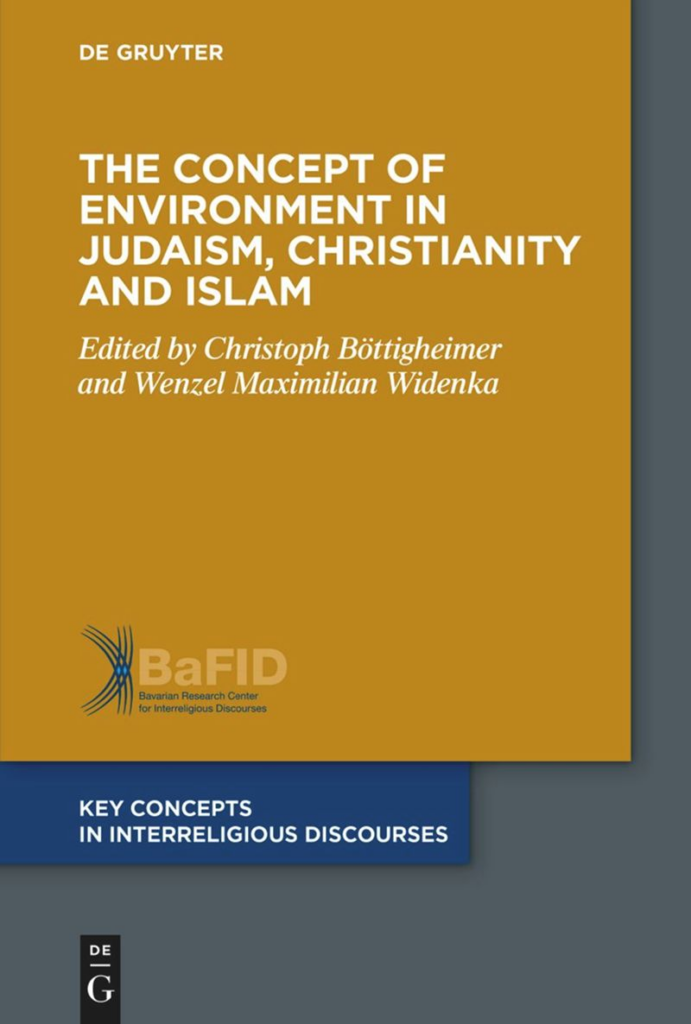
The Concept of Environment in Judaism, Christianity, and Islam brings together the insights from an important conference that aimed to foster mutual understanding and peaceful interactions among the Abrahamic faiths through examining key environmental concepts. Organized by the research unit “Key Concepts in Interreligious Discourses” jointly run by the Friedrich-Alexander-University Erlangen-Nuremberg and the Catholic University Eichstätt-Ingolstadt, the conference was held online in June 2020 due to the COVID-19 pandemic. International experts from theology, religious studies and philosophy of religion intensively discussed and clarified environmental ideas from the perspectives of Judaism, Christianity and Islam. The essays compiled in this volume elucidate the theological foundations and moral imperatives related to environmental protection within the three faiths, highlighting both commonalities and differences. By shedding light on how each tradition understands and teaches humanity’s relationship with nature, the book offers valuable insights for enriching pedagogy and fostering meaningful interfaith collaboration on current ecological challenges.
Edited meticulously by Christoph Böttigheimer and Wenzel Maximilian Widenka, this compilation includes illuminating contributions from renowned scholars like Rabbi Yonatan Neril, Rabbi Leo Dee, Kerstin Schlögl-Flierl and our very own academic Yasin Dutton. By exploring the shared religious foundations and moral frameworks regarding humanity’s relationship with the natural world, this book enables us to enrich our pedagogy and collaborate meaningfully with our Jewish and Christian counterparts to address pressing ecological challenges.
The authors analyze a treasure trove of scriptural sources including Quranic verses, Hadiths, Biblical excerpts, Jewish legal texts and more to construct a theological basis for environmental care. As Muslim educators, we must highlight how the Quranic and Prophetic teachings as elucidated in this book emphasize the rights bestowed upon all of Allah’s creation, from humans to animals, plants and even water sources. Students must appreciate how the Islamic conception of nature is centered on balance, compassion and justice.
The book also demonstrates how Islam promotes the sustainable use of natural resources through concepts like charity, moderation, simplicity and wastage avoidance. Here the authors showcase howenvironmental conscientiousness was ingrained within Muslim communities historically, from efficient irrigation methods to resource sharing arrangements during the Prophet’s time. We must educate our students on how adopting less consumptive, ethical lifestyles aligns with Islamic tenets.
On the seventh day, God rested and thus completed his creation. Likewise, man should rest on the seventh day and every seven years leave the fields fallow to rest. If you like, a divine economic and environmental programme is encountered here. “Subdue the earth” is not to be misunderstood as a mandate to subjugate and exploit, but on the contrary as a call to preserve God’s “very good” creation. Its current explosiveness illustrates precisely this fundamental relationship. Even secular circles now speak of the “integrity of creation” as a matter of course. And in Muslim countries, scholars and activists are preparing to launch a “green Islam”, based of course on Quranic principles.
Additionally, the parallels drawn with Judaism and Christianity reveal areas for fruitful collaboration. As Muslim educators we must leverage the common ground explored in this book, be it scriptural injunctions… to develop interfaith initiatives tackling local ecological challenges. Joint tree planting drives, recycling programs and visits to nature reserves can foster inter-community bonds while allowing students to apply their shared faith values towards environmental protection.
Hands-on initiatives like these, coupled with moral and theological lessons from the divine scriptures, will help transform students from passive spectators into active protectors of the environment. Only by channeling their knowledge into actions will the values of ecological stewardship truly take root. As educators, we must therefore find creative ways to provide students with opportunities to not just learn about caring for creation, but to literally roll up their sleeves and participate in the important work of safeguarding the natural world.
Ultimately, as the authors accentuate beautifully, the environmental crisis calls on all people of faith to return to their scriptures and traditions which exhort compassion and moderation in utilizing God’s gifts on Earth. As Muslim educators we are central to nurturing such mindfulness in our students. We welcome your wisdom as we embark on this sacred educational journey together.

